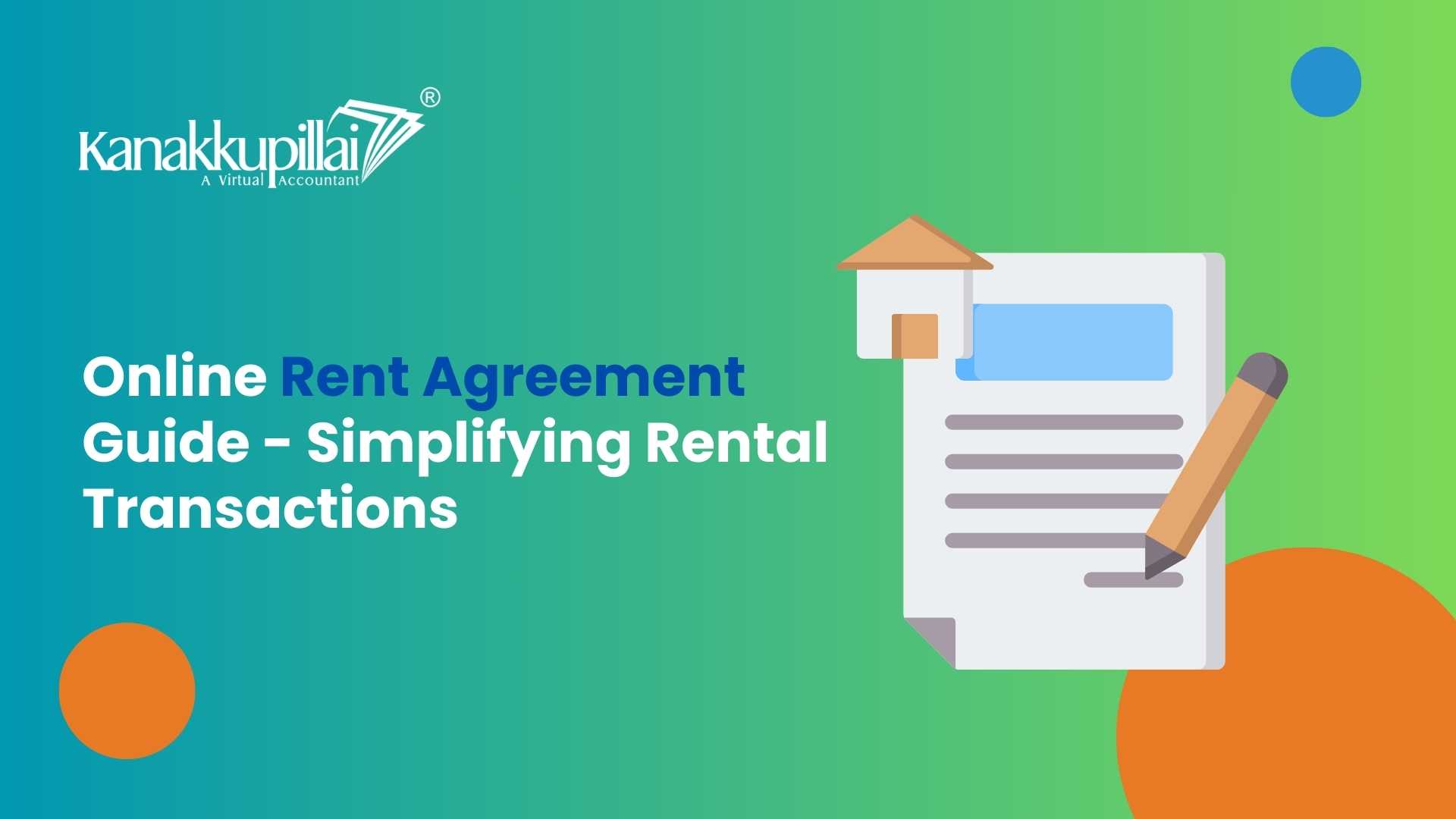![]()
Digitization has left its imprint across every aspect of our lives, making our processes faster and simpler than ever before. One area that has experienced dramatic transformation is the rental sector, where online solutions have replaced paper forms. This article investigates these differences thoroughly, highlighting benefits, legalities and step-by-step processes for online rent agreements in India.
Tradition of Rent Agreements in India: Historically, rental agreements in India were predominantly paper-based contracts requiring extensive paperwork and physical verification processes. But with digital platforms emerging as viable solutions to rental contracts, this has evolved considerably; online rent agreements now offer more convenient, time-saving and eco-friendly agreements than their paper predecessors.
Advantages of Online Rental Agreements: (Convenience/Time Saving/Environmental Benefits)
Online platforms make the rental agreement process seamless for landlords and tenants, offering them the chance to conclude it without needing physical presence in person. E-signatures enable ease of completion regardless of one’s geographical location.
Time Efficiency:
Digital processes significantly shorten the timeline for agreement completion; documents can be created, reviewed and signed within an hour or two of review and signatures being accepted by both parties. Instantaneous communication channels also facilitate quick resolution of queries or concerns raised during review processes. Cost Savings: Lastly, Cost Efficiency allows businesses to find better value through collaboration agreements. It eliminates unnecessary steps associated with agreements, such as reviewing draft documents before sending them to multiple signatories.
Online rent agreements reduce expenses associated with printing, travel, and courier services. E-stamping services integrated into online platforms often make e-stamp payment simpler, eliminating physical stamp papers altogether!
Legal Framework of Online Rent Agreements
Validity of E-Signatures:
Under the Information Technology Act 2000 and subsequent amendments, electronic signatures are recognized as legally valid signatures that bind online rental agreements facilitated through these means.
Stamp Duty and Registration:
Stamp duty registration is an integral component of a rent agreement, and most online platforms provide electronic stamping services to ensure compliance with stamp duty regulations.
Since different states require registration of rent agreements, registration requirements will likely differ between platforms and states. Some require electronic stamping as an acceptable process, while others mandate registration by registration agencies; platforms often provide assistance during this registration step.
Register a Rental Agreement Online in India
Registration of rental agreements involves several steps and will depend upon which state or union territory your contract resides in, though we have provided you with this general guide as an aid:
Create the Rental Agreement:
Draft an in-depth rental agreement that covers particulars such as the names and addresses of both landlords and tenants, the rent amount, the security deposit amount, the duration of the lease term, and any relevant terms and conditions.
Make sure the agreement meets the rules and regulations set out locally.
Stamp Duty:
Establish the applicable stamp duty amount when signing your rental agreement. Stamp duty rates differ across states and union territories and typically can be found online through the official websites of each respective government body.
E-Stamping:
Many states allow individuals and entities to pay stamp duty through an electronic stamping portal provided by their government. Visit your state or union territory’s revenue department website, follow their instructions, and create an E-stamp certificate.
Register Your Details on Registration Portal: In many states and union territories, you can set up an electronic registration account to pay your stamp duty online. These payments may cost an extra 0.1% fee, but this service offers convenience!
Many states offer online registration portals for rental agreements. You can register an account with them by creating an account on an official website and following their steps.
- Fill in Details from Your Rental Contract: Upload the E-Stamp Certificate and Other Necessary Documents
- Book a Time Slot: Some states allow you to book an appointment time slot for registration processes. Select an ideal day and time.
- Visit Your Sub-Registrar Office or Verify Online: Depending on the state, you may need to go directly into their subregistrar office with physical copies of rental agreements and necessary documentation; some states allow online verification instead.
- Biometric Verification at Sub-Registrar Office: Both landlord and tenant will require biometric verification at a sub-registrar office before registration fees are due for payment either online or at their sub-registrar office, usually dependent upon rental value and duration of the lease agreement.
- Receiving of Registered Agreement: Ultimately, you will receive your Registered Agreement, which should clarify its purpose and obligations under it.
Once verified and payments have been completed successfully, a registered copy of your rental agreement will be delivered as a legally binding document. Submit Copies to Relevant Agencies: In certain states, copies of registered agreements must be sent to relevant local authorities so their records remain up-to-date.
When purchasing real estate, be certain to research and follow all applicable state or union territory procedures, as each may differ in terms of requirements and procedures.
Common Concerns and FAQs (FAQs) for Online Platforms:
Security measures were implemented on reputable platforms (Encryption/payment gateways/etc.) to safeguard user information.
- Enforceability of Online Agreements: Legally binding online rental contracts complying with relevant laws and regulations are legally enforceable contracts, such as online rent agreements.
- Dispute Resolution Mechanisms: Many platforms provide dispute resolution mechanisms like mediation or legal assistance on-board for resolving conflict issues on an ongoing basis. Legal Safeguards and Compliances:
- Comprehensive Terms and Conditions: Rent agreement platforms typically offer templates with extensive terms and conditions that landlords and tenants should read over carefully to reach an understanding before signing on the dotted line. Clarifying clauses related to rent escalation, maintenance responsibilities and dispute resolution in advance can help reduce miscommunication in the future.
- Data Privacy and Confidentiality: Privacy considerations are at the core of every online transaction. Reputable platforms abide by data protection regulations to maintain confidentiality regarding personal information provided during agreement processing. Understanding a platform’s privacy policy and complying with data protection laws are vitally important to both parties involved.
Technological Integration and Innovation: Blockchain Technology
Some platforms are exploring integrating blockchain technology to increase security and transparency when entering online rent agreements. Blockchain’s immutable and decentralized ledger can safeguard against fraud while protecting agreement integrity.
Artificial Intelligence in Document Verification:
AI-powered tools are being implemented to streamline document verification processes, such as automatic identification document authentication. This ensures the validity and accuracy of information provided to both parties involved. Its Government Initiatives and Recognitions:
E-Governance Integration: Some Indian states actively encourage digitization initiatives, and online rent agreements could form part of this drive. Staying abreast of government initiatives and any regulations and changes related to online rental agreements is crucial for both landlords and tenants.
Challenges and Solutions: Connectivity Issues and Digital Literacy can hinder these plans from going full force, but potential solutions include creating digital literacy education classes for tenants as part of this drive.
Accessing online rent agreement platforms may present a challenge in remote areas or among individuals with limited digital literacy; initiatives to expand digital literacy and increase internet connectivity could help address this gap.
Standardizing Rent Agreements across States
Legal requirements regarding renting agreements can differ between Indian states, making the process simpler for landlords and tenants. Achieving more uniformity would streamline this step further in both processes.
Advocating for uniform stamp duty rates and registration requirements across states could provide a more consistent experience. Future Trends and Predictions:
Smart Contracts: Smart contracts – which execute autonomously via code written into them – could revolutionize online rent agreement processes.
Smart contracts may automate certain aspects of renting processes, including rent payments and renewal notifications.
Virtual Reality Property Tours: Thanks to advanced technology, virtual reality property tours may become standard features on rental platforms – giving prospective tenants a realistic overview of properties without physically visiting each one.
User Feedback and Platform Reviews: Before selecting an online platform to create rental agreements, landlords and tenants should carefully read user reviews and rating systems of such services.
Feedback from other users of a platform is an effective way of measuring its reliability, customer service capabilities and overall user experience.
Reliable online platforms prioritize taking feedback from their users into consideration to continuously optimize the platform to meet shifting user demands and needs, with iterative process development designed to accommodate these shifts over time.
Users are invited to provide constructive feedback, creating an environment conducive to collaboration among the platform and its user base. Environmental Impact and Sustainability:
Reducing Paper Consumption: One of the primary environmental advantages of renting online is reduced paper usage. Online transactions help save trees while decreasing carbon emissions from printing and transporting printed documents.
Platforms can demonstrate their commitment to sustainability by emphasizing it, drawing in users with environmental interests.
Carbon Neutral Practices: Many platforms employ carbon-neutral practices to offset their environmental impacts through initiatives like planting trees or investing in renewable energy projects.
Users searching for eco-friendly platforms must consider these measures when selecting an online service.
Cybersecurity Measures
Protecting Data: Rent agreement platforms contain sensitive personal and financial data, which should remain protected with reliable cybersecurity measures like encryption, secure sockets layer (SSL) certificates, regular audits and encryption technology to keep user information from prying eyes. Mes Community Building and Networking: Connect Landlords with Tenants:
Some online platforms go beyond simply helping landlords and tenants sign rental contracts by creating an environment where both sides can interact freely. Features like forums, discussion boards or networking events create an inclusive atmosphere, allowing members to exchange experiences and offer advice freely. Tenant Screening Services:
Platforms may offer additional services, like tenant screening, to assist landlords in making informed decisions. Such screening services could include background checks, credit history verification, and rental references, contributing to an easier rental experience and creating greater security and trustworthiness within the rental process.
Government Approvals / Recognition from Authorities
Government recognition and endorsement of online rent agreement platforms are crucial in building their credibility and encouraging wider adoption. Partnerships between platforms and government agencies may result in the development of standardised processes that meet legal requirements.
Integration With Government Portals:
Foresighted platforms may investigate integrations with government portals to simplify stamp duty payment, registration and compliance with legal regulations.
Integration between rental properties can create an integrated rental ecosystem.
Conclusion
India’s landscape for online rent agreements continues to change rapidly, putting emphasis on user experience, security, and sustainability. As technology develops and user needs change, platforms may introduce new features and services to remain competitive – whether this means increasing cybersecurity measures, adopting sustainable practices or fostering community spirit; all hold exciting possibilities that offer landlords and tenants alike exciting possibilities – staying informed on trends as they emerge and actively engaging innovative platforms can result in more seamless rental experiences for both landlords and tenants.





